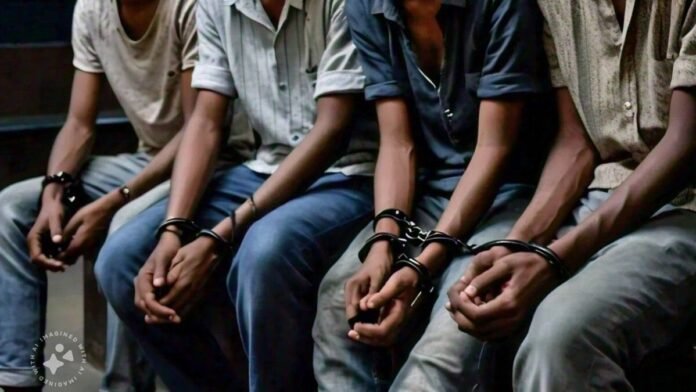Tripura Police have intensified their war on drugs. In a major statewide crackdown, officers detained nearly 80 individuals suspected of being involved in drug trafficking and abuse. What’s more concerning—several among the detainees have tested positive for HIV, raising alarms over the public health impact of the drug crisis in the region.
The state government has taken immediate steps to provide medical care and initiate counselling for those affected. The police crackdown is part of an ongoing mission to eliminate narcotic networks and reduce drug addiction, especially among the youth.
HIV Cases Among Detainees Raise Health Alarms
According to a senior police official, the detentions were made over the past week from various hotspots across Agartala, Dharmanagar, and Udaipur. During the medical screening of the suspects, health authorities confirmed multiple HIV-positive cases, suspected to be linked to injectable drug use and needle sharing.
“Of the nearly 80 people detained, a significant number showed symptoms of infectious diseases. Upon testing, several were confirmed HIV-positive,” a police health team member said.
The development has sparked concern among public health officials. The Health Department has since partnered with local NGOs to provide antiretroviral therapy (ART), awareness campaigns, and regular follow-ups for those infected.
Multi-District Operation Targets High-Risk Zones
The operation, coordinated by Tripura Police and the State Narcotics Bureau, targeted areas long identified as vulnerable to drug smuggling and usage. Among the seizures were heroin, brown sugar, syringes, banned pharmaceutical drugs, and cash suspected to be proceeds from drug sales.
Police said the raids followed weeks of surveillance and tip-offs. Several peddlers were caught red-handed with narcotics in their possession. Some of those arrested were repeat offenders.
“This crackdown is part of our zero-tolerance policy towards drug syndicates,” said West Tripura Superintendent of Police. “We’re not only targeting dealers but also tracing their links to larger interstate and cross-border networks.”
Government Reacts, Promises Continued Action
Chief Minister Dr. Manik Saha praised the police force for its swift and coordinated action. Also, he also stressed that rehabilitation must go hand in hand with enforcement.
“We are committed to making Tripura drug-free. But our mission also includes healthcare, counselling, and bringing addicts back into society,” said the CM at a press briefing in Agartala.
The state’s health authorities are working on integrating routine HIV screenings in detention facilities. Moreover, outreach teams are also focusing on awareness programs in schools, colleges, and high-risk neighbourhoods.
Rise of Drug-Related HIV Cases in Northeast India
Tripura’s crisis is not an isolated one. Several states in Northeast India—such as Manipur, Mizoram, and Nagaland—have witnessed a rise in HIV cases linked to injectable drug use over the past decade. Also, experts warn that without immediate intervention, the trend could worsen.
According to the National AIDS Control Organisation (NACO), nearly 6% of all HIV infections in the Northeast are attributed to injectable drug use. Tripura now joins the list of states that must confront this dual crisis of drug abuse and infectious disease.
Community-Based Solutions on the Way
In response to the situation, Tripura Police have also engaged civil society organisations. Local bodies like the Tripura AIDS Control Society (TACS) and rehabilitation NGOs are being roped in for intervention and reintegration efforts.
Officials are encouraging families to come forward for counselling and treatment of drug-dependent individuals. Police hotlines and anonymous reporting systems have also been strengthened.
The public is urged to stay alert and report drug-related activity to local authorities. Families dealing with drug addiction are encouraged to seek medical help and counselling. For more updates on the state’s efforts, visit tripurapolice.gov.in.


